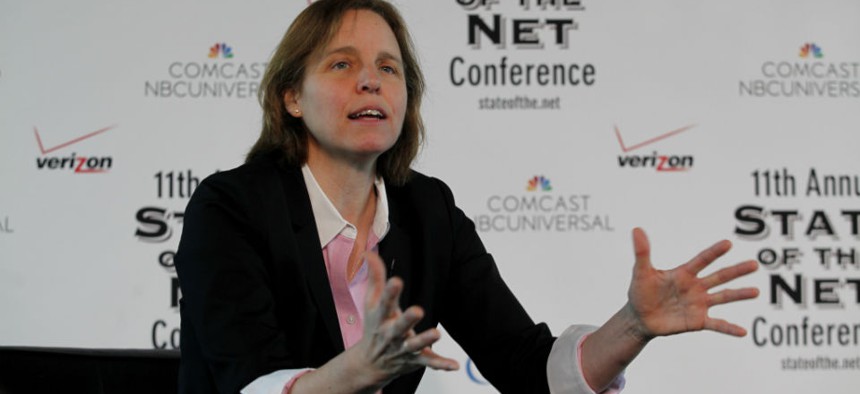Another Gender Equality Fail: Top Tech Execs Still Clueless About Women

United States CTO Megan Smith // Flickr user Internet Education Foundation
Google chairman's gaffe seems more the tech industry standard than an isolated bout of ignorance.
Google Chairman Eric Schmidt is a brilliant businessman and a certified billionaire nine times over, but he doesn’t appear to have a clue about gender equality or women in technology.
That much was obvious Monday when Schmidt repeatedly talked over and interrupted fellow South by Southwest panelist U.S. Chief Technology Officer Megan Smith during a discussion about -- you guessed it -- gender equality in technology.
He spoke over Smith, a former Google employee, and even suggested which audience questions Smith should respond to. It became so awkward that a woman in the audience eventually called Schmidt out, prompting raucous applause.
Mercifully, the panel didn't run long because if it had, Schmidt might have asked Smith to schedule his appointments, cook his dinner and fold his freaking laundry.
Unfortunately, Schmidt’s unconscious gaffe seems more the tech industry standard than an isolated bout of ignorance.
A few months ago, Microsoft CEO Satya Nadella told women with tech jobs not to ask for pay raises. He suggested women who don’t ask for raises accumulate “good karma” that bosses apparently equate to deserving more responsibility.
“It’s not really about asking for a raise, but knowing and having faith that the system will actually give you the right raises as you go along,” Nadella told his interviewer, Maria Klawe, back in October at the Grace Hopper Celebration of Women in Computing.
In short: He was completely full of it.
Let’s face it: Very few people -- male or female -- get ahead in any sector by sitting on their hands and trusting “the system.”
On the bright side, at least Nadella didn’t talk over Klawe or tell her which questions to ask, yet his lack of social consciousness cost Microsoft a Twitter firestorm and “good karma” in the department of public perception. He later issued an apology, but how many young, tech-educated women with multiple job options would choose to work for Microsoft after hearing that?
Only 29 percent of Microsoft’s total employees are women, and women comprise only 17 percent of its tech and engineering personnel. Those statistics mirror Google’s workforce numbers and are generally indicative of the workforce reality tech-educated women face as a whole. With tech heads like Nadella and Schmidt, it’s a wonder the numbers are even as high as they are.
Smith exuded cool dealing with Schmidt’s interruptions, taking the classy approach over the confrontational one. As Wall Street Journal reporter Danny Yadron noted, Smith offered up stats on how differences in how men and women act can contribute to inequality in the workplace. She then shared a story about how she’ll occasionally “float ideas at meetings and get no response.” Thirty minutes later, she said, a man will offer up the same idea, stealing it.
Maybe Smith can float an idea to her old boss, Schmidt, and forward it over to Nadella, about how the tech industry can begin to fix its very obvious problem with gender and racial diversity.
Thirty minutes later, they might come up with something special.






